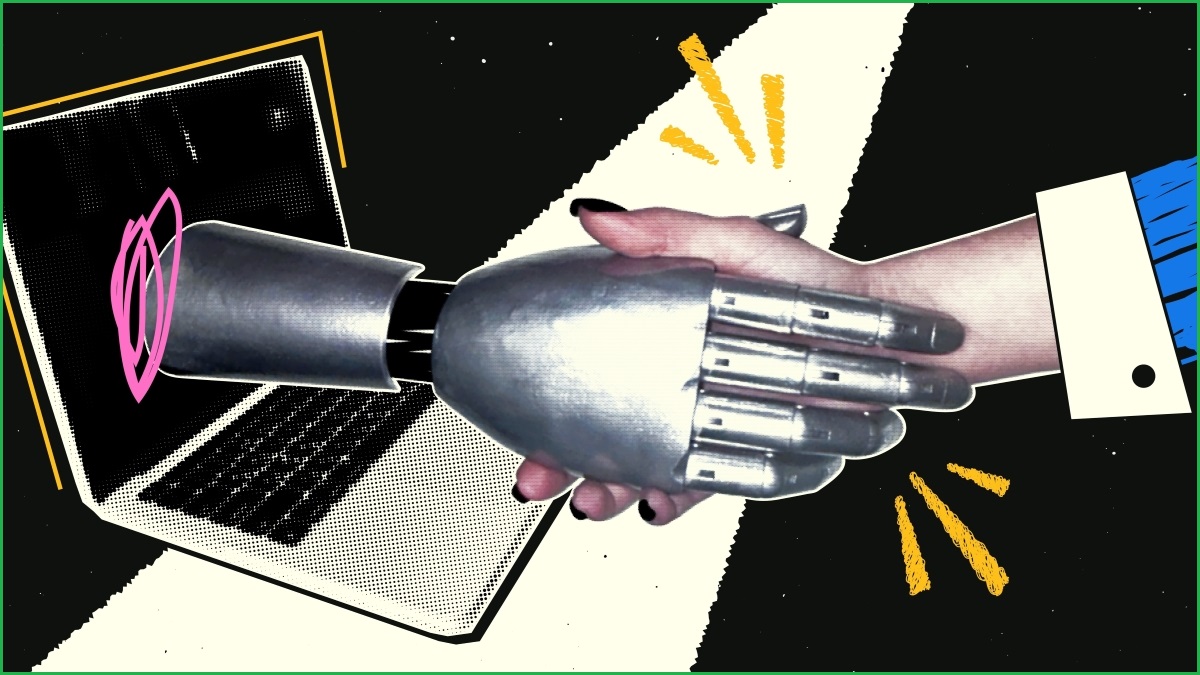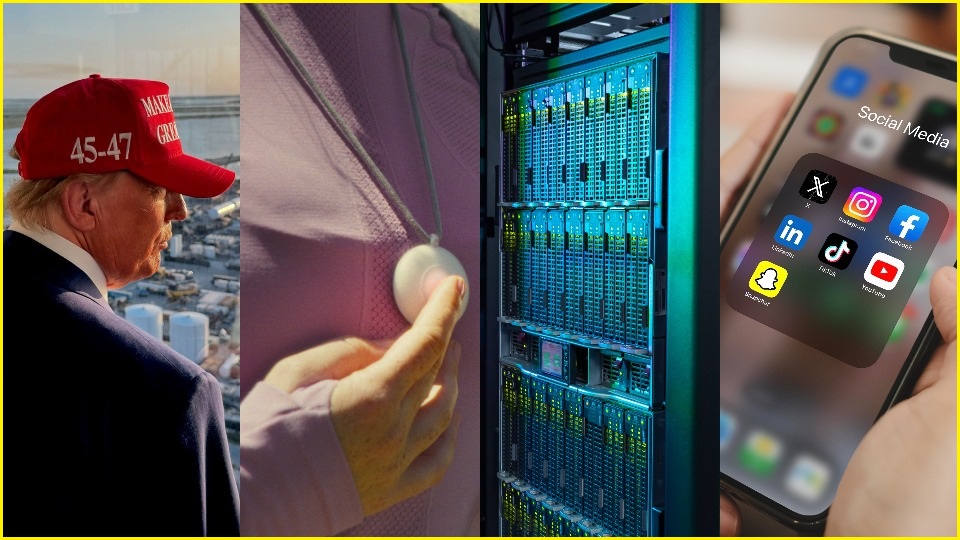With another year of technology news behind us, it's time to gaze into our 8K OLED crystal ball to see what we are likely to see in 2025.
It was another big year for artificial intelligence in 2024, and we are expecting more of the same in 2025 — with AI in more consumer products, increasingly capable AI agents at our constant disposal, and billions more dollars being invested into data centres (and nuclear energy) to power it all.
With Donald Trump returning to the White House and billionaire Elon Musk advising Trump's government, Big Tech is in for an interesting year which could benefit Musk more than his tech bro counterparts.
In Australia, a new federal election could see an increase in mis- and disinformation online, before a contentious ban on under-16s holding social media accounts comes into effect.
To find out more about what to expect in 2025 — and what sector experts are predicting — you can click on the sections below or simply read on:
- Agentic AI might finally be useful
- Cyber security grapples with AI’s power
- Donald Trump does Donald Trump things
- Tech issues will influence Australia’s election
- More AI products mean more ‘AI washing’
1. Agentic AI might finally be useful
While generative AI chatbots such as OpenAI’s ChatGPT have been mainstream for a couple of years, so-called agentic AI is expected to build more momentum in 2025.
The technology enables AI models to use computer systems to complete tasks which humans might otherwise handle, such as online shopping, administration, and even business decisions.
Research and consulting firm Gartner predicts there will be five billion connected products with the potential to behave as customers by 2026, “shopping for services and supplies for themselves and their owners”.
We’ve already seen companies such as Anthropic and Google show off agent-like abilities in their AI models — such as in Google's Project Mariner demo below — but their capabilities are still being developed.
Glenn Nethercutt, chief technology officer at software company Genesys, says while generative AI will continue to be a useful tool, agentic AI will take things “to the next level”.
“No longer just passive assistants, agentic AI will tackle complex, multi-step tasks that defy a simple, predefined path and require adaptation and real-time decision-making, such as coordinating logistics or dynamically managing schedules,” he says.
“Think of it as the Jarvis to your Tony Stark—it coordinates multiple AI agents, each focused on a specific part of a task, to deliver seamless, real-time solutions that adjust with every new piece of information.”
Jay Jenkins, chief technology officer at cloud computing firm Akamai Technologies, says 2025 will see agentic AI begin to take this more active role in our lives.
“Rather than just helping you navigate the process of booking an appointment with your healthcare provider, these agents could potentially handle it directly, offering you available time slots without any extra effort on your part,” he says.
Speaking at the New York Times DealBook Summit in early December, OpenAI CEO Sam Altman — whose company is reportedly planning to release an agentic AI system in 2025 — said it made sense that many industry figures were predicting big things for the technology in the next 12 months.
“This idea that you can give an AI system a pretty complicated task,” he said, “Like a task you’d give to a very smart human — that takes a while to go off and do, and use a bunch of tools, and create something of value.
“That’s the kind of thing that I’d expect [in 2025], and that’s a huge deal … that can really transform things.”
John Roese, chief technology officer and chief AI officer at Dell Technologies, says "the word of 2025 will be 'agentic'".
"It is a defining advancement in AI technology and will be a catalyst for significant progress in how we approach AI architecturally."
David Irecki, chief technology officer at software company Boomi, predicts AI agents will outnumber human workers at some point in 2025.
“They’ll transform everything from onboarding to enterprise systems,” he says.
“But with their rise comes a critical need for oversight—without it, these digital workers could turn from assets to liabilities.”
Kellie Hackney, regional vice president of Zendesk Australia and New Zealand, predicts more companies will allow consumers to engage with their brand using digital assistants such as Google's Gemini, Amazon’s Alexa, and Apple’s Siri.
“According to our data, 67 per cent of consumers are ready to delegate customer service tasks like tracking orders, managing subscriptions or memberships, and scheduling appointments or bookings to AI, underscoring an opportunity for companies to embrace assistant-first experiences,” she says.
2. Cyber security grapples with AI’s power
Both offensive and defensive uses of AI are likely to become increasingly visible in the world of cyber security in 2025, according to sector experts.
One of Australia’s largest cyber security companies, Tesserent, warns AI will be used to increase the frequency of attacks on local infrastructure and to orchestrate more sophisticated social engineering ploys.
The company’s chief information security officer, Jason Plumridge, predicts that while AI-based tools will become cheaper and more prevalent for cyber criminals in 2025, “the good guys will use AI to fight back”..
“We are likely to see AI drive scripting and coding, making the attacks easier to perform for cyber-criminals as they attempt to target known critical infrastructure vulnerabilities in new ways," he says.
“… Tesserent predicts that AI will continue to advance as a core element of data analysis, threat monitoring and orchestrated and automated response as part of an organisation's security program throughout 2025.”
 AI can be both a help and a hinderance when it comes to cyber security. Image: Shutterstock
AI can be both a help and a hinderance when it comes to cyber security. Image: Shutterstock
Chris Gibson, CEO of global cyber security non-profit FIRST, agrees that AI attacks are a growing threat for critical infrastructure such as power grids, healthcare facilities, and transport networks.
He says the continued influence of the technology means we will see “an arms race in the cyber realm, where both defenders and attackers are constantly trying to outpace each other in AI adoption and innovation”.
“AI-driven systems will analyse vast amounts of data in real-time, identifying patterns and anomalies that might indicate a breach far faster than any human could,” he says.
“They will automate routine tasks, freeing up our skilled professionals to focus on more complex challenges."
Cyber security firm Proofpoint’s area vice president for Australia and New Zealand, Crispin Kerr, predicts threat actors will begin to attempt manipulating private data sources used by AI large language models (LLMs) in 2025.
“For example, we may see threat actors purposely trick AI by contaminating private data used by LLMs — such as deliberately manipulating emails or documents with false or misleading information — to confuse AI or make it do something harmful,” he says.
“As AI agents increasingly depend on private data in emails, software-as-a-service document repositories, and similar sources for context, securing these threat vectors will become even more critical.”
Experts say both the public and private sectors’ difficulties in finding and retaining cyber security talent are also expected to continue in 2025.
Chris Chard, chair of Creative Content Australia, says AI could also cause media piracy rates to increase in 2025 as pirates use more easily accessible AI tools to “scale up their operations and evade detection”.
3. Donald Trump does Donald Trump things
Donald Trump’s second non-consecutive term as US president is set to begin with his inauguration on 20 January.
Trump is expected to repeal the Executive Order on AI development which outgoing president Joe Biden signed in October 2023 in an attempt to regulate the technology.
“While [repealing the Executive Order] could help innovation, it would also increase the potential harms of AI,” says Dexter Thillien, an analyst at The Economist Intelligence Unit.
Elon Musk, who spent more than $388 million ($US250 million) to help Trump get reelected, has promised to “delete” government regulation and spending as part of his role co-leading a new entity dubbed the Department of Government Efficiency, which will actually "provide advice and guidance" to Trump's administration from outside of government.
Trump’s new administration will reportedly seek to ease rules on self-driving cars — which is one of Musk’s key business priorities as CEO of electric vehicle manufacturer Tesla.
“With Elon Musk on board, authorisation might be granted for autonomous vehicles, even as the technology is not yet fully mature for such a roll-out,” Thillien says.
Trump is also expected to slash corporate tax for companies that manufacture domestically and end tax breaks for electric vehicles — which is expected to hurt Tesla a lot less than it would hurt its rivals.
Musk is also expected to use his influence with Trump to attempt to benefit his other companies, such as social media platform X (formerly Twitter), space technology firm SpaceX, brain-computer interface lab Neuralink, AI developer xAI, and satellite internet provider Starlink.
Could Musk and Trump decide to combine X (which has been heamoreging users to platforms like Bluesky and Threads) with Trump's social media platform Truth Social?
Stranger things have happened.

Elon Musk's relationship with Donald Trump and new role advising his government are expected to benefit the entrepreneur's many business ventures. Photo: Shutterstock
Trump's return to the White House is also expected to bring hefty tariffs on goods from China, and potentially on semiconductors from outside the US.
"Should this go ahead,” Thillien says, “it would not only make it less likely for foreign companies to invest in the US, as this is contingent on US subsidies, but also make it more expensive for US companies to buy goods manufactured abroad.”
US and Australian officials reportedly told Nine that it "would be risky for the Albanese government to follow through on anti-tech company policies”, such as its crackdown on social media platforms and attempts to make them pay for local news content, as it could increase the risk of Trump imposing tariffs on Australian goods.
Australia’s moves to implement a duty of care for major digital platforms and a bespoke children’s online privacy code are also at odds with Big Tech's big profits.
The incoming Trump administration also promises to be strict on immigration, and there are concerns it could target those with H-1B visas — many of whom work for US technology companies.
“[US] technology recruitment, which is already very competitive, could become harder,” says Thillien, but it means more tech workers may look outside of the US for opportunities.
4. Tech issues will influence Australia’s election
Australia’s next federal election will occur sometime before mid-May 2025, and there are a few technology-related issues which could inform the experiences and decisions of voters.
The Australian Electoral Commission (AEC) revealed it May that it expected there would be an increase in AI-generated deepfakes and misinformation around the 2025 federal election.
The commission said it did not have the technology or capability to combat such threats — and that was before the government walked back its controversial plan to establish legislation preventing the spread of mis- and disinformation.
“As Australia is coming into the federal election, establishing integrity around how to trust online content and how to authenticate it will become increasingly prominent," says Daniel Sutherland, regional vice president for digital security firm DigiCert.
The incumbent Labor government’s banning of under-16s from holding social media accounts, which it legislated with the opposition's support at the end of November, isn’t expected to take effect until late 2025, which would put it after the election.
While the ban would likely go ahead if Labor lost the election to the Liberal-National coalition, the issue remains a contentious one for some voters, and is not supported by The Greens and several independents.
A report on a trial of age assurance technologies designed to help government and industry implement the social media ban is expected to arrive around mid-2025, but experts have raised concerns about the reliability and privacy implications of the technologies being tested.

Anthony Albanese and Peter Dutton are expected to face off in a federal election before mid-May 2025. Photos: Anthony Albanese, Peter Dutton / Facebook
Where there is a stark technology policy divide between the two major parties is in energy, where Labor favours renewables and the Coalition argues nuclear power will help secure Australia's energy future.
AI’s huge data centre energy usage has already made it harder for tech giants to reach their environmental goals, and the technology's energy consumption is expected to increase in 2025.
Gartner estimates 335 terawatt-hours of electricity will be needed to power new AI servers across the world in 2025, up from 261 terawatt-hours in 2024.
We have already seen the likes of Meta, Microsoft, Google, and Amazon tap nuclear energy in attempts to maintain power supplies and ward off increases to their CO2 emissions, amid concerns about possible short-term power shortages in some locations.
Another issue pushed by the opposition is Labor’s dealings with US company PsiQuantum, which is receiving $470 million from the federal government to help it build a quantum computer in Brisbane.
The opposition is arguing a parliamentary inquiry should be held into the investment, claiming PsiQuantum was “given a head start” over local companies, while Queensland’s new Liberal government says it is reviewing its own contribution to the project.
If Queensland does pull out — or if an inquiry finds evidence of wrongdoing — it could be a major blow for one of the country’s most expensive technology investments.
Elsewhere, the Albanese government is planning to implement mandatory guardrails for high-risk uses of AI, which some industry figures have welcomed while others have warned they could be a drag on Australian innovation and investment.
5. More AI products mean more ‘AI washing’
While most AI-focused consumer products failed to gain mainstream appeal in 2024 — such as the Rabbit r1 and the Humane AI pin — we can expect more such devices on the market in 2025.
Humane wants to put its AI operating system in other devices, while renowned former Apple designer Jony Ive — best known for his work on the iPhone and iPod — is working on an AI-based device with OpenAI.
It’s unclear if OpenAI's device will be released in 2025, but we could get some initial details or a first look at what the company is planning.
Ive's former employer, Apple, is reportedly working on a wall-mounted smart home display for 2025 "that can control appliances, handle videoconferencing and use AI to navigate apps", according to Bloomberg.
In the startup realm, the Friend necklace — an “always listening” AI wearable which uses Anthropic's Claude LLM — is expected to start shipping in 2025.
In a similar vein, the Limitless Pendant says it will be “the world’s most wearable AI”, with claims it will help organise your life while preserving important conversations and meetings.
Smart glasses and smart rings with AI capabilities are likely to become a little more mainstream in 2025, but we are also likely to continue seeing AI features and marketing pop up in everything from doorbells to household appliances, and cars.
Amid this proliferation of AI products, more and more companies will hire experts to help fend off accusations of so-called AI washing (named much like greenwashing) in 2025, according to Brett Weigl, Genesys’ senior vice president of AI product management.
"With so many organisations today claiming to integrate AI in some capacity, many consumers are curious as to what’s truth and what’s exaggeration,” he says.
“Instead of excitement, AI offerings are met with skepticism, and companies claiming to use the technology will have to prove it or reap the consequences of consumer distrust.”
Without companies better explaining how they are actually using AI to benefit customers, “AI washing could be the trend that severely diminishes consumer trust and turns away investors,” Weigl says.










